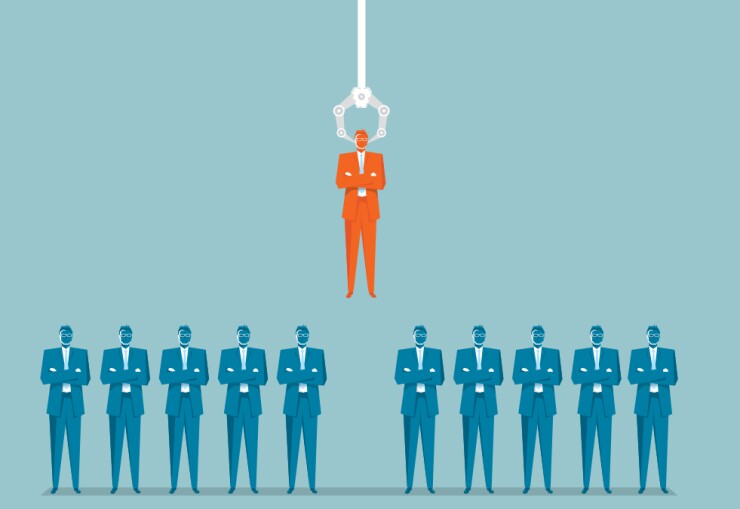Banks are in a war for talent, not just with each other, but also with the likes of tech firms that are seen as cooler places to work. Who wants to wear a suit every day when you can wear jeans and a T-shirt?
As the economy improves, this competition for new hires across all job categories — whether entry-level or experienced — will only intensify.
So some are turning to artificial intelligence to help broaden their applicant pools and identify the candidates who display the passion, the aptitude and the leadership skills they are looking for.

Jim Edrington, chief member engagement officer at the American Bankers Association, attributes the emerging trend to necessity. "Banks can't find the people they need anymore just by looking at graduates from the top schools and at GPA and test scores," he said.
One of the pioneers in using AI for recruiting is Citigroup, which is piloting this type of approach in its corporate and investment banking unit. The unit has 15,000 applicants for its 2018 summer intern program — all students in undergraduate or MBA programs — and wants to do a better job of identifying those who could be a long-term fit.
"We're looking at using big data and AI to enhance our ability to hire people who are more likely to be retained by the bank, and to stay longer than they would traditionally stay," said Bill Fisse, a Citi managing director for global campus recruiting and program management strategy.
Citi is conducting its pilot with a four-year-old Seattle startup called Koru, which calls itself a "predictive hiring" firm.
Kristen Hamilton, co-founder and chief executive of Koru, said the company's process is to develop a set of 450 data points for job applicants.
Each one takes a detailed, customized "fit test" that shows how they rate in seven categories that Koru claims are predictive of workplace performance — grit, rigor, impact, teamwork, curiosity, ownership and polish. A client bank — Koru has several of varying sizes — would decide what weighting to put on each of those categories.
At this point, Citibank is just using those test results in its hiring process for next summer's intern pool. But it will then be following the lucky 200 it selects, particularly those who end up working for the bank as regular employees, to help it develop a predictive model — called a "fingerprint" — for achieving even better results with future hires.
"We'll see how people that we hire using this system are tracking," said Courtney Storz, who heads global campus recruitment and program management for Citi. "There will be a huge data set to analyze and study, and as we follow hiring and performance cycles, we'll be able to look at how predictive the fit score is and effectively refine the fingerprint over time."
Hamilton said that a big bank like Citi is ideal for Koru's process because the number of applicants and hires provides a sizable data set. However, the model can be scaled down to work for companies hiring as few as 25 people, she said. Where the number of job vacancies to be filled is small, a "fingerprint" for future hires can be developed by testing existing employees instead of just new hires, she added.
She declined to discuss the cost, other than to say that a smaller institution might pay in the range of $10,000 to $30,000 — "less than the cost of making one bad hire."
Koru is just one of a growing group of companies offering predictive hiring based on data analytics of one kind or another. Others include Knack, Pymetrics, McFrank & Williams and Talent Analytics.
Haig Nalbantian, senior partner at Mercer and co-lead of Mercer's Workforce Sciences Institute, cautioned that algorithm-based predictive hiring poses a risk. "If not used cautiously, you can end up hiring a bunch of clones," he said.
But, he added, "the trend is here and you're only going to see more of it," especially in industries like banking with a lot of customer-facing employees.





